简单句,复合句,并列句
- 格式:doc
- 大小:56.00 KB
- 文档页数:4
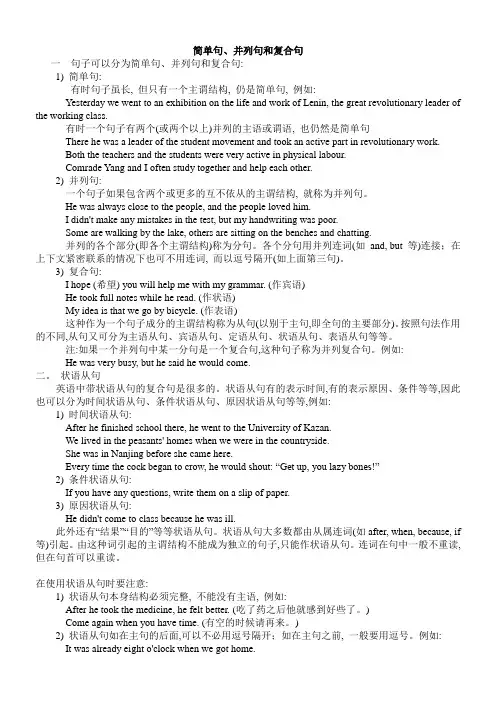
简单句、并列句和复合句一句子可以分为简单句、并列句和复合句:1) 简单句:有时句子虽长, 但只有一个主谓结构, 仍是简单句, 例如:Yesterday we went to an exhibition on the life and work of Lenin, the great revolutionary leader of the working class.有时一个句子有两个(或两个以上)并列的主语或谓语, 也仍然是简单句There he was a leader of the student movement and took an active part in revolutionary work.Both the teachers and the students were very active in physical labour.Comrade Yang and I often study together and help each other.2) 并列句:一个句子如果包含两个或更多的互不依从的主谓结构, 就称为并列句。
He was always close to the people, and the people loved him.I didn't make any mistakes in the test, but my handwriting was poor.Some are walking by the lake, others are sitting on the benches and chatting.并列的各个部分(即各个主谓结构)称为分句。
各个分句用并列连词(如and, but 等)连接;在上下文紧密联系的情况下也可不用连词, 而以逗号隔开(如上面第三句)。
3) 复合句:I hope (希望) you will help me with my grammar. (作宾语)He took full notes while he read. (作状语)My idea is that we go by bicycle. (作表语)这种作为一个句子成分的主谓结构称为从句(以别于主句,即全句的主要部分)。
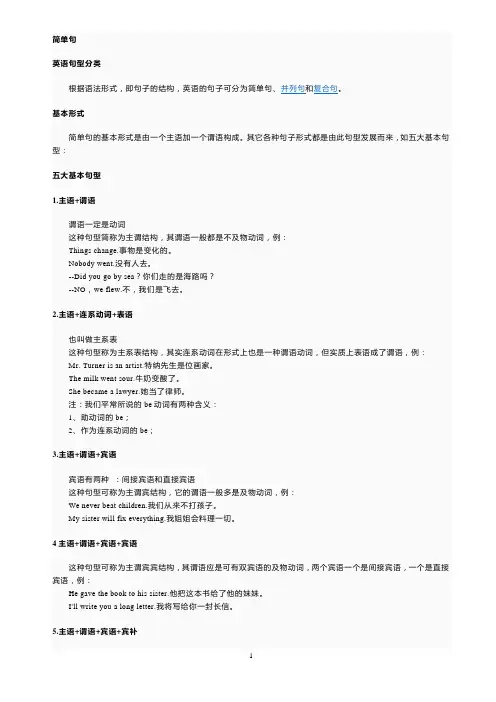
简单句英语句型分类根据语法形式,即句子的结构,英语的句子可分为简单句、并列句和复合句。
基本形式简单句的基本形式是由一个主语加一个谓语构成。
其它各种句子形式都是由此句型发展而来,如五大基本句型:五大基本句型1.主语+谓语谓语一定是动词这种句型简称为主谓结构,其谓语一般都是不及物动词,例:Things change.事物是变化的。
Nobody went.没有人去。
--Did you go by sea?你们走的是海路吗?--NO,we flew.不,我们是飞去。
2.主语+连系动词+表语也叫做主系表这种句型称为主系表结构,其实连系动词在形式上也是一种谓语动词,但实质上表语成了谓语,例:Mr. Turner is an artist.特纳先生是位画家。
The milk went sour.牛奶变酸了。
She became a lawyer.她当了律师。
注:我们平常所说的be动词有两种含义:1、助动词的be;2、作为连系动词的be;3.主语+谓语+宾语宾语有两种:间接宾语和直接宾语这种句型可称为主谓宾结构,它的谓语一般多是及物动词,例:We never beat children.我们从来不打孩子。
My sister will fix everything.我姐姐会料理一切。
4主语+谓语+宾语+宾语这种句型可称为主谓宾宾结构,其谓语应是可有双宾语的及物动词,两个宾语一个是间接宾语,一个是直接宾语,例:He gave the book to his sister.他把这本书给了他的妹妹。
I'll write you a long letter.我将写给你一封长信。
5.主语+谓语+宾语+宾补所谓宾语补足语就是补充说明前面的宾语这种句型可简称为主谓宾补结构,其补语是宾语补语,与宾语一起即构成复合宾语,例:I found the book easy.我发现这本书不难。
(形容词easy作补语)I'll let him go.我将让他去。
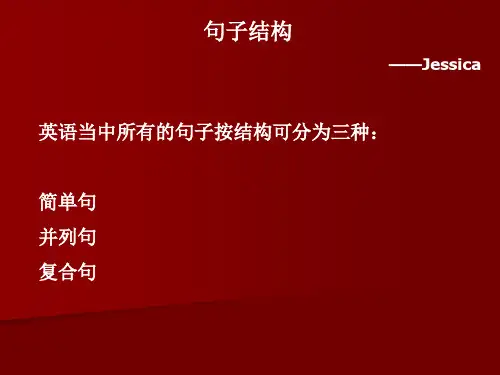
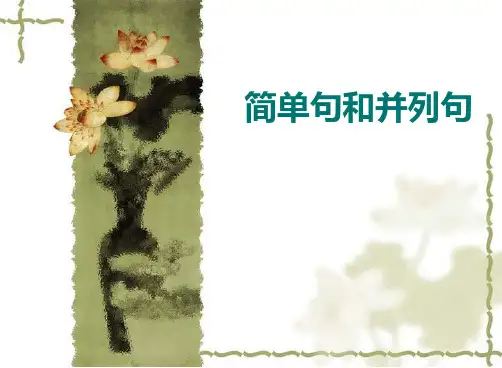

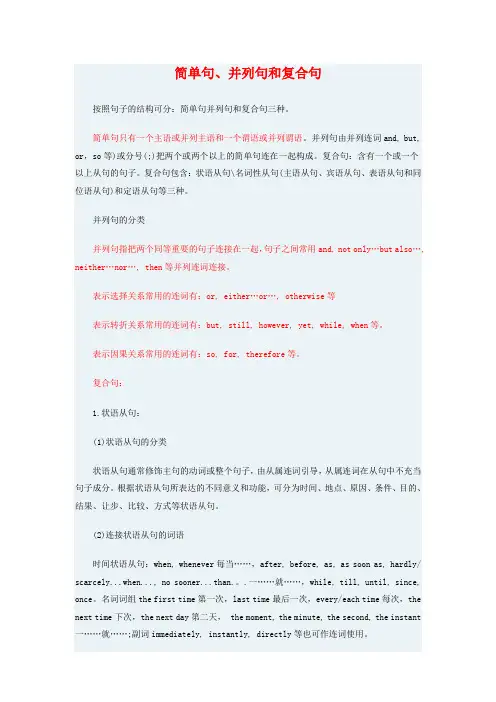
简单句、并列句和复合句按照句子的结构可分:简单句并列句和复合句三种。
简单句只有一个主语或并列主语和一个谓语或并列谓语。
并列句由并列连词and, but, or,so等)或分号(;)把两个或两个以上的简单句连在一起构成。
复合句:含有一个或一个以上从句的句子。
复合句包含:状语从句\名词性从句(主语从句、宾语从句、表语从句和同位语从句)和定语从句等三种。
并列句的分类并列句指把两个同等重要的句子连接在一起,句子之间常用and, not only…but also…, neither…nor…, then等并列连词连接。
表示选择关系常用的连词有:or, either…or…, otherwise等表示转折关系常用的连词有:but, still, however, yet, while, when等。
表示因果关系常用的连词有:so, for, therefore等。
复合句:1.状语从句:(1)状语从句的分类状语从句通常修饰主句的动词或整个句子,由从属连词引导,从属连词在从句中不充当句子成分。
根据状语从句所表达的不同意义和功能,可分为时间、地点、原因、条件、目的、结果、让步、比较、方式等状语从句。
(2)连接状语从句的词语时间状语从句:when, whenever每当……,after, before, as, as soon as, hardly/ scarcely...when..., no sooner...than.。
.一……就……,while, till, until, since, once。
名词词组the first time第一次,last time最后一次,every/each time每次,the next time下次,the next day第二天, the moment, the minute, the second, the instant 一……就……;副词immediately, instantly, directly等也可作连词使用。
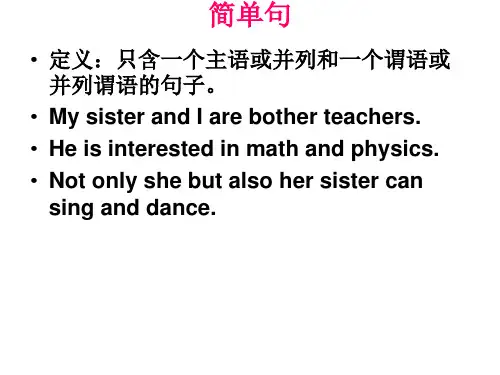
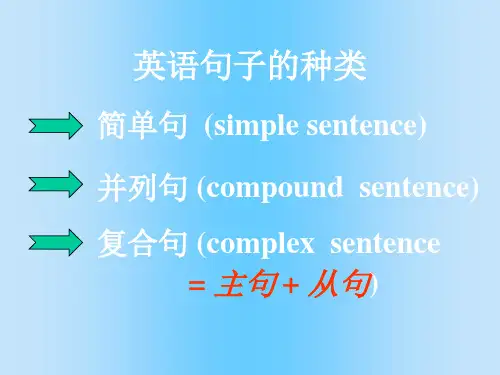
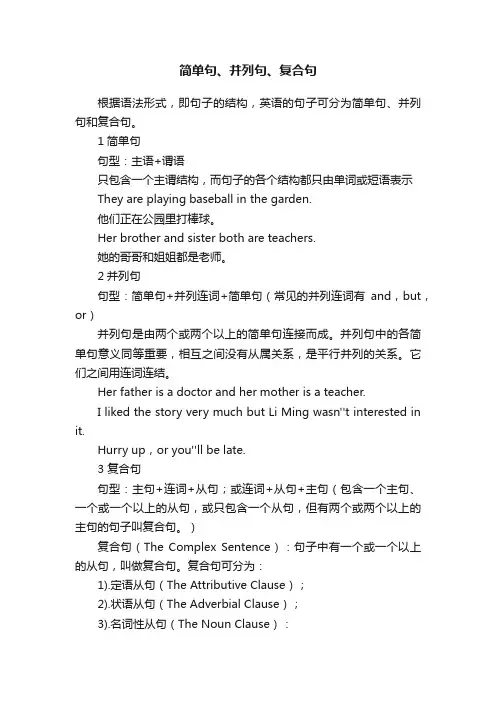
简单句、并列句、复合句根据语法形式,即句子的结构,英语的句子可分为简单句、并列句和复合句。
1简单句句型:主语+谓语只包含一个主谓结构,而句子的各个结构都只由单词或短语表示They are playing baseball in the garden.他们正在公园里打棒球。
Her brother and sister both are teachers.她的哥哥和姐姐都是老师。
2并列句句型:简单句+并列连词+简单句(常见的并列连词有and,but,or)并列句是由两个或两个以上的简单句连接而成。
并列句中的各简单句意义同等重要,相互之间没有从属关系,是平行并列的关系。
它们之间用连词连结。
Her father is a doctor and her mother is a teacher.I liked the story very much but Li Ming wasn''t interested in it.Hurry up,or you''ll be late.3 复合句句型:主句+连词+从句;或连词+从句+主句(包含一个主句、一个或一个以上的从句,或只包含一个从句,但有两个或两个以上的主句的句子叫复合句。
)复合句(The Complex Sentence):句子中有一个或一个以上的从句,叫做复合句。
复合句可分为:1).定语从句(The Attributive Clause);2).状语从句(The Adverbial Clause);3).名词性从句(The Noun Clause):一、定语从句定语从句的定义定语从句在句子中作定语,用来修饰一个名词、名词词组或者代词。
先行词和引导词被修饰的名词、名词词组或代词叫做先行词;在先行词和定语从句之间起连接作用的词叫做引导词。
引导词分为“关系代词”和“关系副词”。
关系代词和关系副词关系代词有:who, whom, whose, that, which, as。
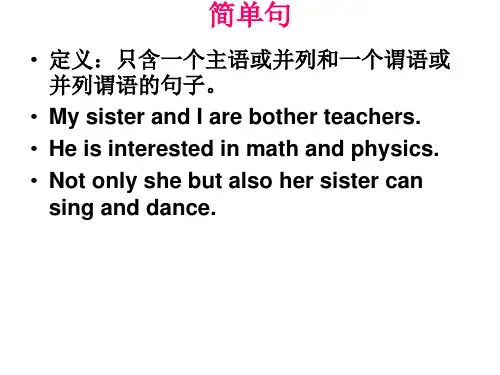
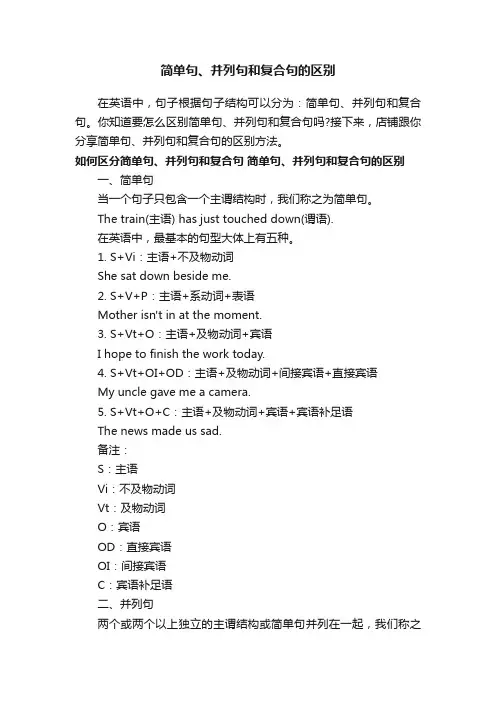
简单句、并列句和复合句的区别在英语中,句子根据句子结构可以分为:简单句、并列句和复合句。
你知道要怎么区别简单句、并列句和复合句吗?接下来,店铺跟你分享简单句、并列句和复合句的区别方法。
如何区分简单句、并列句和复合句简单句、并列句和复合句的区别一、简单句当一个句子只包含一个主谓结构时,我们称之为简单句。
The train(主语) has just touched down(谓语).在英语中,最基本的句型大体上有五种。
1. S+Vi:主语+不及物动词She sat down beside me.2. S+V+P:主语+系动词+表语Mother isn't in at the moment.3. S+Vt+O:主语+及物动词+宾语I hope to finish the work today.4. S+Vt+OI+OD:主语+及物动词+间接宾语+直接宾语My uncle gave me a camera.5. S+Vt+O+C:主语+及物动词+宾语+宾语补足语The news made us sad.备注:S:主语Vi:不及物动词Vt:及物动词O:宾语OD:直接宾语OI:间接宾语C:宾语补足语二、并列句两个或两个以上独立的主谓结构或简单句并列在一起,我们称之为并列句。
各个简单句间是平行并列的关系,而非从属关系。
并列句的各个分句间可用逗号、分号、起连接作用的副词或并列连接词来连接。
1. 能连接并列句的连词and(和,又),but(但是),for(因为),however(然而),or(或者),so(所以,因而),while(然而),yet(然而)2. 能连接并列句的复合连词or else(否则,要不然),either...or...(要么···,要么···;或者···,或者···),neither...nor...(既不···,也不···),not only...but also(不仅···,而且···)3. 能连接并列句的副词besides(而且,还有),hence(因此),otherwise(否则,要不然),then(然后,于是),therefore(因此,所以),thus(因而,从而) 根据并列分句之间的不同关系,并列句则可以分为以下四种。
中考英语语法专项复习:简单句、并列句和复合句句子按结构可分为简单句、并列句和复合句。
复合句中包含宾语从句、状语从句或定语从句等。
◆一简单句简单句就是只包含一个主谓结构的句子,其句式结构主要有五种:①主 + 谓。
He works in a big company. 他在一家大公司工作。
②主 + 系 + 表。
She is a kind girl. 她是一个善良的女孩。
③主 + 谓 + 宾。
Ann eats junk food twice a week .安一周吃两次垃圾食品。
④主 + 谓 + 间宾 + 直宾。
He gave me a pen .他给我一支钢笔。
⑤主 + 谓 + 宾 + 宾补。
He kept me waiting for two hours .他让我等了两小时。
◆二并列句并列句由两个或两个以上的简单句连接而成。
并列句中的各简单句同等重要,没有从属关系,是并列的关系,之间用并列连词连接。
1. 表示顺承的并列连词有and / not only …but (also)等。
如:She not only gaveus a lot of advice, butalso helped us to overcome difficulties .他不仅给了我们很多建议,而且还帮助我们克服困难。
2. 表示选择的并列连词有or,either …or …等。
如:Either you or Maria will haveto go .你或玛丽亚得去一趟。
3. 表示转折的并列连词有but,yet,however 等。
如:It is hot in summer here , butit’s not cold in winter .这里夏天热,但冬天不冷。
4. 表示因果关系的并列连词有so,如:He works hard , so he is one of the topstudents in our class .因为他学习努力,所以他是我们班最优秀的学生之一。
句子有什么句式结构类型和特点句式结构类型和特点在汉语中,句式结构千变万化,主流结构包括简单句、复合句和并列句。
其中,简单句结构最简单,一般由主语和谓语构成;复合句是包含从句的复杂句子,可以分为主从复合句和名从复合句;并列句是由两个或更多的独立分句连接而成,连接词可以是并列连词、分号等。
不同的句式结构,代表着文本整体的语言风格和特点。
简单句结构简明流畅,适合表达简单、直接的意思;复合句结构复杂多变,可以有较高的表述和措辞水平,适用于叙述详细和复杂的情境和信息;并列句结构在表达对比、并列、转折等复杂思路时效果比较好。
分析基于以上分析,我会从句式结构类型、句式结构特点、应用场景和优缺点四个方面进行分析。
句式结构类型:句式结构主要分为简单句、复合句、并列句三类。
简单句结构简洁明了,强调信息的简洁性和清晰性;复合句结构复杂多变,适合大篇幅的句子运用;并列句结构比较适合句子间对比、并列、转折等复杂的关系。
句式结构特点:简单句结构最为明了,如“太阳出来了”、“他在吃东西”等,结构简单易懂;复合句结构相对复杂,同时又由于包含了几个从句,且要避免长句,所以句式变化比较多样化,同时也需要讲究重点和强调,以便清晰表述;并列句结构则着重于句子之间的并列、对比以及链接关系。
应用场景:不同的文章需要采用不同的句式结构,一般文章采用多样化的句式会更有兴趣。
如新闻报道以简单句为主,以略去主干的书写方式出现;小说、诗歌等文学作品则更青睐复杂多变的句式结构,以此强调文学性和艺术性;科技文章则强调逻辑性和系统性,往往采用并列句等结构。
优缺点:简单句结构简短明了,表达清晰,但是过于简洁也容易导致表达单薄;复合句结构运用广泛,可以强化信息量和语言表达能力,但是若不注意句式的简洁和重点突出,容易冗长和繁琐;并列句结构比较适用于表达转折、并列、对立等含义,可是单纯的并列结构可能会出现错位、重复等问题。
结语句式结构是语言表达的基本单元,不同的句式结构具有不同的表达功能。
简单句、并列句和复合句考点一简单句1.简单句只包含一个主谓结构.2.五种简单句:1)主+谓. He comes at last.2)主+系+表. She is a teacher.The soup tastes nice.3)主+谓+宾. They reached the village.4)主+谓+间宾+直宾. He gave me a pen.5)主+谓+宾+宾补. I find that book very useful.考点二并列句并列句:两个或两个以上的简单句,用连词连接起来;常用的连接词有:1.表示顺承关系的:and, not only…but also不仅….而且….等;She ______ gave us a lot of advice, _______ helped us to overcome difficulties.Linda tried to become an excellent teacher, _____ at last she succeeded.2.表示选择关系和否定条件的有or还是,否则Do you want to leave now ____ would you rather set off laterWear your coat, ____ you’ll catch a cold.3.表示转折关系的有but, yet等;He is young, but he works hard.虽然他年轻,但工作努力;4.表示因果关系的有for, so 等;My leg hurts so I go to see a doctor. 我的腿疼,因此我去看医生;考点三主从复合句:宾语从句1.宾语从句的引导词1引导陈述句用 that在口语和非正式文体中常常省略He tells me that he is going shopping this Sunday.2 引导一般疑问句用if或whether.She asked me if\ whether she could join us. whether…or not3 引导特殊疑问句,要用原来的特殊疑问词;She asked them what they were doing.2.宾语从句的语序:要用陈述句语序;I want to know when the train left.3. 宾语从句的时态1主句是一般现在时,一般将来时或祈使句,宾语从句可根据实际需要选用各种时态;He tells us that he has been able to look after himself.(2)主句是过去时态,宾语从句应使用过去时的相应时态;They said that they had already finished the work.(3)如果宾语从句叙述的是客观事实、真理、自然现象等,不管主句用什么时态,从句都用一般现在时;He said that light travels faster than sound.3. 练习1She asked me, “Will you go to the cinema tomorrow”改为含宾语从句的复合句She asked me______ I ______ go to the cinema the next day.2 How lovely the dog is Can you tell me _____A. where did you get itB. where will you get itC. where you got it3 --- Can you tell me _____ your parents at home--- I often wash clothes and sweep the floor.A.how will you helpB. how you helpC. how will you helpD. howdo you help4 When I was young, my grandfather told me that the sun ______ rise in the east.考点四状语从句一、状语从句在复合句中作状语,修饰主句中的动词、形容词、副词等;1.地点状语从句地点状语从句通常由 where 引导;Put all the things _____they were.A. whereB. whenC. whoseD. which2.时间状语从句主句用将来时,从句用一般现在时时间状语从句的引导词有when, before, after, until, as soon as, since, while, as 等She was cooking when someone knock at the door.What will you do after you finished your homework3.条件状语从句在条件状语从句中,常用的引导词有if, unless等;If it dosen’t rain, I” ll go fishing.They will have a picnic unless it rains next Sunday.4.原因状语从句原因状语从句常用的引导词有because, as, since既然等He didn’t come because he was ill.Since we are students, we should study hard.Because 和so 不能在一个句子中同时使用;5. 结果状语从句结果状语从句主要由so…that…, such…that…引导;It’s so hot that we want to go swimming.That’s such an interesting story that everybody likes it.So… that…与简单句之间的句型转换1)that后的句子是否定句,常用too…to进行转换;He is so young that he can’t go to school. he is too young to go to school.2)that后的句子是肯定句;常用enough to 进行转换;The shirt was so cheap that he bought it. the shirt was cheap enough for him to buy.6.目的状语从句目的状语从句常用的引导词有so that, in order that 等 in order to 简单句Please say it in a loud voice so that everyone can hear it.He works harder in order that he can go to a good college.7. 让步状语从句引导词有though, although, even if, even though尽管等;He often helps others though\ although he is not rich.They will stand by you even if you don’t succeed.Though, although与but 不能同时出现在一个句子中8.比较状语从句比较状语从句由than, as…as…, not as\so… as等引导;比较级He is more outgoing than I.He ran as fast as Mike.二、练习1. It’s quite common in Britain to say “thank you”to the drivers _____ people get off the bus.a. afterb. sincec. untild. when2. The art club is for members only. You can’t go in ____you are a member.a. unlessb. becausec. ifd. though3. Now many parents send their children to foreign countries, _____ they want them to get a better education.a. untilb. thoughc. because4. ---- What would some students like to do after finishing their education---- They would like to start to work_______ they needn’t depend on their parents completely.a. as soon asb. so thatc. befored. while考点五定语从句修饰某一名词或代词的从句叫定语从句;被定语从句修饰的词叫先行词,引导定语从句的词叫关系词关系代词和关系副词;1.关系代词的基本用法The man __________spoke at the meeting is from Hong Kong. 指人作主语The building ___________is being built will be used as a hospital.指物作主语I visited a scientist _______ name is known all over the world. 指人作定语2. 关系代词特殊用法1当关系代词在从句中作主语时,从句的谓语动词要与先行词保持一致;He is one of the boys who ______ like playing football.He is the only one of the boys who________ like playing football.2 通常以下四种情况关系代词只能用that而不能用which.1 先行词为all, much, something, everything, nothing, little, none, the one 等不定代词时2先行词被形容词最高级修饰时;3当先行词被the only, the very, the just等修饰时;4先行词中既有人又有物时;3. 关系副词的基本用法;1 when 在句中作状语,表示时间;2 where 在句中作状语,表示地点;.3 why 在句中作状语,表示原因;He remembers the day _______ he joined the League.This is the reason_______ he is late today.This is the place _______ Lu Xun was born.1. 2011泰安--- _______do you read English newspapers---I read China Daily every day.A. How longB. How soonC. How oftenD. How far2.2011抚州John had a short walk after lunch, _______A. did heB. didn't heC. had heD. hadn't he3.2011宁波--- _______do you have an Art Festival in your school---Once a year.A. How longB. How oftenC. How farD. How soon4.2011安徽省If you want to go to see the movie this evening, so _______I.A. doB. amC. willD. should5.2011长沙 _______tall the girl isA. HowB. HowaC. WhatD. What a6.2011长沙 _______ call me Mimi It's my cat's name.A. NotB. Didn'tC. Doesn'tD. Don't7.2011长沙They went to the park yesterday,_______A. don't theyB. didn't theyC. aren't theyD. can't they8.2011福州---Li Mei usually helps others, _______---Yes, she is kind-hearted.A. does sheB. is sheC. doesn't she9.2011眉山There _______an English party in our school tomorrow evening.A. haveB. will haveC. is going to haveD. will be10. 2011济南--- _______a year does your school have sports meetings---Twice a year.A. How oftenB. How soonC. How longD. How many times11. 2011泰州---I have changed my job.---_______.A. So do IB. So have IC. So I doD. So I have12. 2011济南Mike learns a lot about Internet. And _______.A. I don't, eitherB. so do IC. so am I am, too13. 2011眉山Jim never goes to the movies on Saturday, _______A. does JimB. doesn't JimC. doesn't heD. does he14. 2011玉州You've just finished your listening exam Please getyourself ready for the next part, _______A. shall weB. will youC. do youD. are you15. 2011眉山--- _______the weather like last Monday---It was sunny.A. How wasB. What'sC. What wasD. How is16. 2011潍坊_______great scientist Qian Xuesen isA. HowB. HowaC. WhatD. What a17. 2011眉山--- _______do you visit your grandparents---Once a month.A. How soonB. How longC. How muchD. How often18. 2011内江--- _______ do you speak English so well---Because I practice it with my partner every day.A. WhyB. WhenC. Who19. 2011泉州---We'll go to Qing Yuan Mountain tomorrow. Why _______join us---That's a good idea.A. notB. don'tC. can'tD. didn't20. 2011泉州There is little milk in the glass, _______A. is thereB. isn't thereC. isn't itD. does it21. 2011肇庆The students in Class Two played basketball against ClassOne yesterday,_____A. did theyB. didn't theyC. weren't they22. 2011宁波---What a new computer Can you tell me_______---Just the day before yesterday.A. how much you paid for itB. how much did you pay for itC. when you bought itD. when did you buy it23. 2011泰安---Tom wants to know if you will have a picnic tomorrow.---Yes. But if it _______, we'll play chess instead.A. will rainB. rainedC. is rainingD. rains24. 2011烟台---Do you know this dictionary belongs to---Let me see. Oh, it's_______.A. who does; mineB. who; meC. whose; mineD. who; mine25. 2011杭州Franklin told them all _______to be in Britain again.A. he was how happyB. how happy he wasC. how was he happyD. he was happy how26. 2011湖州---What kind of movies do you like---I like the movies_______ are about Chinese history.A. whoB. whomC. whoseD. that27. 2011丽水---Do you know _______---Sorry, I don't have a watch.A. whose watch this isB. whose watch is thisC. what time it isD. what time is it28. 2011重庆The woman asked the policeman where _______.A. the post office isB. the post office wasC. is the post officeD. was the post office29. 2011泰安---Can you guess_______ the new schoolbag yesterday.----Sorry, I've no idea.A. how much did he pay forB. how much he spentC how much he paid for D. how much did he spend30. 2011杭州Who is the man_______ is reading a book over thereA. thatB. whichC. whoseD. what31. 2011湖州---Do you know_______---Next Sunday.A. what they will doB. where they will doC. when they will come hereD. who they will meet32. 2011长沙---Can you tell me why_______---Because I want to help the people there.A. do you go to Tibet西藏B. did you go to TibetC are you going to Tibet D. you are going to Tibet33. 2011浙江省---Linda, could you tell me _______---He is an actor.A. what he doesB. what does he doC where he works D. where does he work34. 2011福州---Could you tell me _______---Sure. The day after tomorrow.A. when will you leave for the U.S.A.B. when Mr. Lee will comeC when your father returned35. 2011济南He asked me_______.A. who did kick the first goal in the World CupB. when was the A. PEC meeting heldC when China became a member of the WTOD. where will the 2008 Olympics be held36. 2011玉州Jane is one of the students in the class _______ have everbeen to China.A. whoB. whoseC. whichD. whom37. 2011济宁Can you tell me _______after this examA. what you didB. what did you doC. what will you doD. what you will do38. 2011苏州---Can you tell me how many colours _______ in a rainbow---SevenA. there areB. are thereC. they areD. are they39. 2011潍坊I can't understand _______Apple's iPad 2.A. why are they so mad aboutB. why they are so mad aboutC. how are they so mad aboutD. how they are so mad a。
简单句、并列句、复合句、并列复合句文章来源:互联网在前面各讲中所说的肯定句、否定句、各种疑问句、感叹句等,是根据句子的作用来划分的。
今天,我们再学习一种新的分类方法:即根据句子的内部结构,特别是句子与句子之间的关系来划分的方法。
根据句子结构,可以分为三种主要类型:简单句、并列句、复合句,另外还有一种叫并列—复合句子.要搞懂英语句子结构分类,有一点首先必须明白:即什么是“句子"?句子的概念有两层含义:一是它能表达一个清晰、完整的意思。
反过来讲,只要能表达一个清晰、完整的意思的语言单位,不论是长是短,哪怕是一个单词,也算作是一个句子。
这是从意义方面来说的.二是句子的结构完整。
所谓“完整”,最核心的是一个句子应该有“主语、谓语”.也就是说,有主语、有谓语的语言单位就是一个句子。
这就是从句子结构方面来分的,也是从句子语法成份方面来划分的。
我们所讲的简单句、并列句、复合句都是从主语、谓语来判定句子类型的。
如果按照句子的结构分类,英文句子可分为三种类型:简单句(Simple Sentence),并列句(Compound Sentence)和复合句(Complex Sentence).一、简单句简单句的定义是:或者只有一个主语,或者只有一个谓语.为什么说“或者”呢?因为简单句可以只有一个主语,但有几个谓语;或者可以有几个主语,但只有一个谓语。
这样一分,简单句就有三种形式了。
1、只有一个主语、一个谓语,再加上其它成份。
例如:Light travels faster than sound.光比声传播速度快。
The film is not interesting。
这部电影没有意思。
Can you finish the work on time?你能按时完成工作吗?2、只有一个主语,但有几个谓语,再加上其它成份。
例如:The boy were running, shouting and laughing.男孩们一边跑,一边笑,一边喊叫着。
句子成分什么是句子?句子的定义:句子是包含主语和谓语部分的一组词。
句子的成分:句子由各个组成部分构成,这些组成部分叫做句子的成分。
句子的成分可分为:主语、谓语、表语、宾语、同位语、定语、状语、补语、独立成分等。
句子按其结构可分为:简单句、并列句、复合句、并列复合句。
句子结构一、简单句(Simple sentence)的构成:1.主语+系动词+表语(Subject+Linking verb+Predicative )1) He │was │a student.2) The dinner │smells │good.3) The trouble│is │that they are short of money.2. 主语+谓语(Subject+V erb)1) The moon │rose.2) We all │breathe, eat, and drink.注意:此句型的句子有一个共同特点,即句子的谓语动词都能表达完整的意思。
此种类型句子中谓语动词一般为不及物动词。
3.主语+谓语+宾语(S+V+Object)1) He │enjoys │reading.2) He │has refused │to help them.注意:此句型句子谓语动词都具有实义,都是主语产生的动作,但不能表达完整的意思,必须跟有一个宾语,即动作的承受者,才能使意思完整。
这类动词叫做及物动词。
4. 主语+谓语+双宾语(S+V+O+O)1) He │brought │you │a dictionary.=He │brought │a dictionary │for│you.2) He │showed │me │how to run the machine.注意:有些及物动词可以有两个宾语,这两个宾语通常一个指人,为间接宾语;一个指物,为直接宾语。
一般的顺序为:动词+ 间接宾语+ 直接宾语。
如:Give me a cup of tea, please. 或动词+ 直接宾语+介词+ 间接宾语。
简单句,复合句,并列句鹿俊先江苏省沛县湖西中学 221611通过简单句,复合句,并列句之间的相互转换能够使学习者温故知新,在准确理解的基础上牢固掌握并灵活应用各种复杂的句型。
英语中各种句型间的相互转换常见以下几类:一、简单句←→复合句1、表示动作意义的名词、动名词短语或起名词的作用的不定式短语有时与名词性从句可以互相转变。
例如:His sudden death made us sad. ←→That he suddenly died made us very sad.His words deeply upset me. ←→what he said deeply upset me.The president’s attending the meeting himself gave them a great deal of encouragement. ←→It gave them a great deal of encouragement that the president attended the meeting himself.His coming back so soon was quite unexpected. ←→It was quite unexpected that he should come back so soon.What worried the child was his not being allowed to visit his mother in the hospital. ←→What worried the child was that he was not allowed to visit his mother in the hospital.It is necessary for us to learn how to use the computer. ←→It is necessary that we should learn how to use the computer.Our intention was to help you. ←→Our intention was that we should help you.I hope to become a teacher. ←→I hope that I will become a teacher.Don't forget to attend the lecture. ←→Don't forget (that) you should attend the lecture.I still remember being / having been taken to Beijing when I was a child. →I still remember (that) I was taken to Beijing when I was a child.I'm sure of his failure. ←→I'm sure (<of the fact> that) he will fail.2、某些动词的复合宾语——宾语+宾语补足语,与宾语从句可以相互转变。
例如:The doctor warned me not to eat oily food after the operation. ←→The doctor warned that I mustn't eat oily food after the operation.The managers would like to see the plan carried out the next year←.→The managers would like to see that the plan was to be carried out the next year.I find her easy to get along with. ←→I find (that) she is easy to get along with.The teacher required us to learn the text by heart. ←→The teacher required (that) we should learn the text by heart.在相应的被动语态句型中,主语+ 主语补足语与主语从句可以相互转变。
例如:They were requested to be ready by seven o'clock. ←→It was requested that they should be ready by seven o'clock.He is said to have studied abroad. ←→It is said that he studied / has studiedabroad.(此结构没有相应的主动形式。
也可以与下列相似句型一起记忆:There seemed to be nothing left to do except send for the doctor. ←→It seemed that there was nothing left to do except send for the doctor. / They seemed to be satisfied with the result of the experiment. ←→It seemed that they were satisfied with the result of the experiment. / I happened to be reading at the time. ←→It happened that I was reading at the time.)3、介词短语、不定式短语或分词短语作状语与状语从句可以相互转变。
例如:Having worked with children before, I know what to expect in my new job. ←→As I've worked with children before, I know what to expect in my new job.Having lived in China for years, Mr. Brown still can't speak Chinese well. ←→Mr. Brown still can't speak Chinese well although he has lived in China for years.Taking this medicine, you'll feel better. ←→If you take this medicine, you'll feel better.Unless being diligent, you will fail ←→If you aren't diligent / Unless you are diligent, you will fail.When completed, the museum will be open to the public next year. ←→When it is / has been completed, the museum will be open to the public next year.Though lacking money, his parents managed to send him to university. ←→Though they lacked money, his parents managed to send him to university.In spite of his great success, he does no feel satisfied. ←→Although he has great success/ Although he is very successful, he does no feel satisfied.She was unable to go on with her work because of her poor health. ←→She was unable to go on with her work because she was in poor health.We can do nothing without faith. ←→We can do nothing if we have no faith.Break the glass and push the red button in case of fire. ←→Break the glass and push the red button in case there should be a fire.But for / without your help, I couldn't have finished the task on time. ←→If it hadn't been for your help, I couldn't have finished the task on time.Hoping to sleep / In the hope of sleeping / To sleep late in the morning, Bob turned off the alarm. ←→Bob turned off the alarm so that / in order that he could sleep late.Having walked / After walking for five hours, we were almost exhausted. ←→when we had walked / After we (had) walked for five hours, we were almost exhausted.Used economically, one tin will last for at least six weeks. ←→If it is Used economically, one tin will last for at least six weeks.Walking in the street, I met an old friend of mine. ←→While / When I was walking in the street, I met an old friend of mine.The bridge is wide enough / so wide as for six cars to pass side by side. ←→The bridge is so wide that six cars can pass side by side.He is too young to join the club. ←→He is so young that he can't join the club.Weather permitting, we will visit the Great Wall tomorrow. ←→If the weather permits, we will visit the Great Wall tomorrow.其中一些由连词引导的副词、不定式短语、分词短语、介词短语作状语也可以看作状语从句的省略。